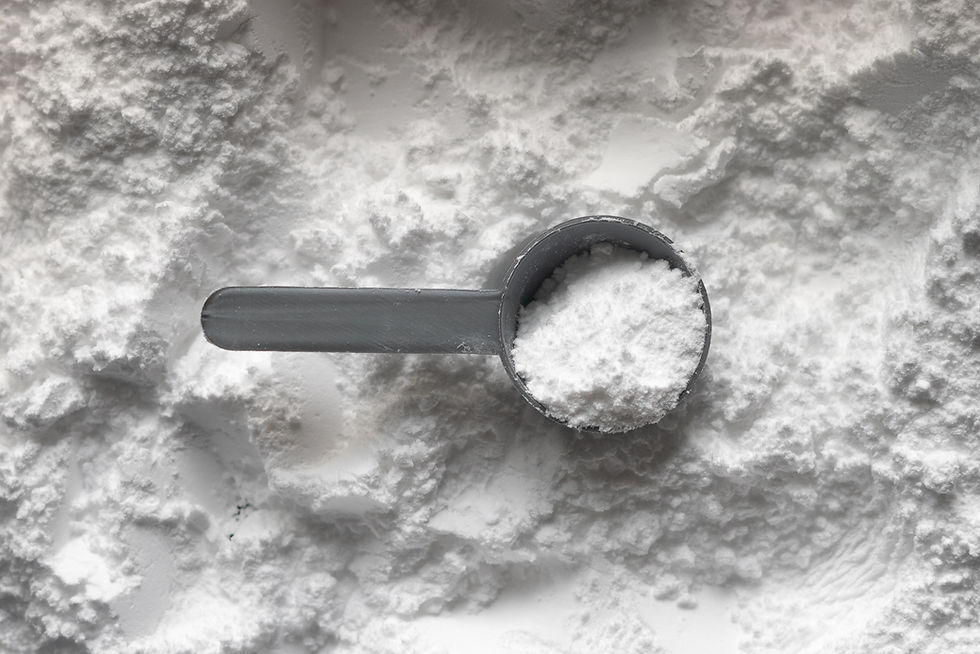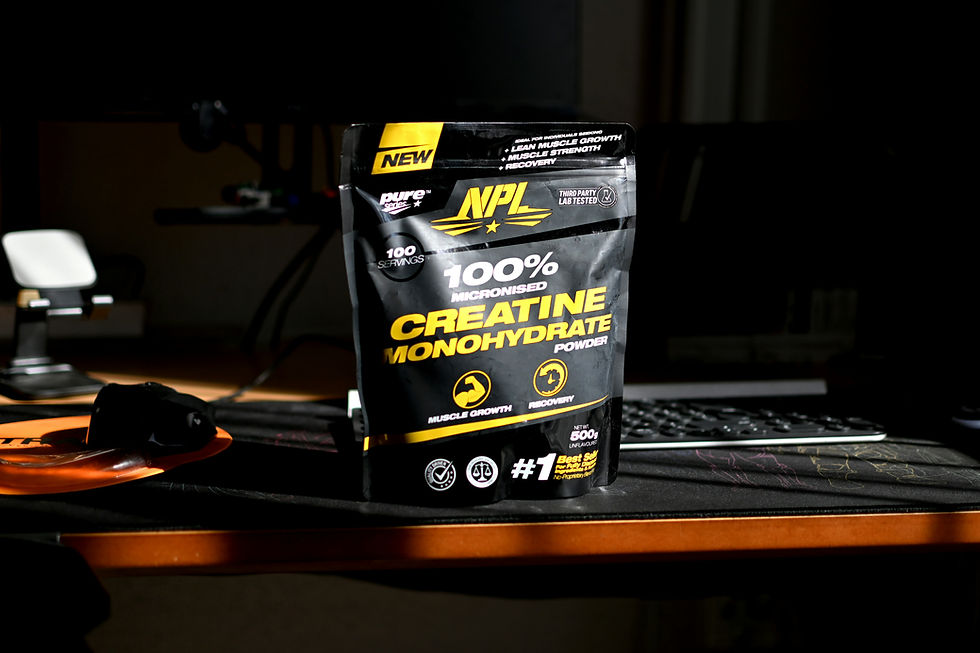Unveiling the Truth: A Briefing on Creatine Use for Women
- Russell Wood
- Jan 17, 2025
- 5 min read
Updated: Feb 4, 2025
Creatine has sparked a lot of conversation in fitness circles, especially around its benefits for women. Many associate creatine with male bodybuilders, thinking it’s only for athletes looking to bulk up. However, as more women begin strength training, understanding what creatine can do for them is more crucial than ever.
This blog post will highlight the benefits of creatine for women, clarify common misconceptions, and offer practical guidelines for its use.

What is Creatine?
Creatine is a compound naturally found in certain foods, like red meat and fish, and is also produced in small amounts by the body, mainly in the liver and kidneys. Its primary role is in energy production during high-intensity exercise, helping to produce adenosine triphosphate (ATP), the energy used by cells.
While often related to muscle gain, creatine can benefit a wide range of individuals, not just elite athletes. Understanding its versatile benefits can help women integrate it into their fitness routines.
Benefits of Creatine for Women
Enhanced Muscle Strength and Performance
One of the key benefits of creatine is its ability to improve muscle strength and performance. For example, a study published in the Journal of Strength and Conditioning Research found that women who supplemented with creatine increased their one-rep max in bench press by an average of 10% over just eight weeks.
This improvement allows women to lift heavier weights and perform additional repetitions, which can lead to significant muscle gains.
Improved Recovery
Creatine also aids recovery after intense workouts. Research shows that it can reduce muscle cell damage and inflammation, speeding up recovery time. A study involving female athletes revealed that creatine users recovered significantly faster between high-intensity training sessions than those who did not.
This prompt recovery allows women to maintain a consistent workout schedule, which is crucial for reaching long-term fitness goals.
Enhanced Cognitive Function
Creatine can boost cognitive function, particularly in stressful situations. A study found that individuals who supplemented with creatine had improved memory performance under fatigue compared to those who did not.
For women managing busy lives—balancing work, family, and fitness—a mental boost from creatine can be particularly beneficial.
Improved Bone Health
Research suggests creatine may contribute to bone health, an important factor for women, especially those at risk of osteoporosis. A study indicated that women supplementing with creatine showed greater gains in bone density compared to those who didn’t.
Combining creatine with strength training can create a powerful approach to maintaining bone health as women age.
Potential Mood Enhancements
Emerging studies suggest creatine could have mood-boosting benefits. For instance, some research links creatine supplementation to reduced symptoms of anxiety and depression. Dr Stacy Simms recent discussion on Diary of A CEO eluded to women on creatine have been found to come out of depressive episodes quicker than those that were not taking the supplement.
While more studies are needed, women experiencing mood fluctuations could find creatine to be a supportive addition to their wellness routine.
Common Myths about Creatine
Myth 1: Creatine is Only for Men
One prevalent myth is that creatine is primarily a male supplement. This idea comes from its association with bodybuilding, a field where men have traditionally dominated.
In truth, creatine offers significant benefits for women. Whether they are beginners or seasoned lifters, women can effectively utilize creatine to enhance their fitness performance.
Myth 2: Creatine Leads to Unwanted Weight Gain
Another misconception is that creatine causes excessive weight gain. While it can result in initial water retention in muscles, this does not equal fat gain.
In fact, most of the weight gained tends to be muscle mass. A meta-analysis indicated that creatine supplementation can lead to an average muscle gain of about 2-5 pounds over several weeks.
Myth 3: Creatine is Harmful to Women
Some women worry about potential side effects. However, extensive research shows that creatine is safe when taken as directed. This being said, taking creatine if you have health conditions such as kidney disease, high blood pressure, liver disease, and heart disease may have an adverse effect.
Before starting any new supplement, it's always wise to consult a healthcare provider, as this ensures a safe approach. Creatine is one of the most studied and effective supplements in sport and generally considered very safe - even women who dont do resistance training take it.
Myth 4: Creatine is Only Useful for Athletes
Another myth suggests creatine is only for elite athletes. In reality, anyone engaged in high-intensity workouts can benefit from it.
Whether just beginning strength training or an experienced lifter, women can enhance their workouts and speed up recovery with creatine.

Best Practices for Using Creatine
Choosing the Right Type of Creatine
When selecting creatine, creatine monohydrate is the most researched and effective form available. Studies have demonstrated its efficacy for improving performance while minimizing side effects.
Look for high-quality creatine monohydrate to achieve the best results.
Proper Dosage
The recommended daily dosage of creatine is about 3-5 grams. Some opt for a loading phase of around 20 grams for the first 5-7 days, but this step is not necessary for everyone. The loading phase has generally been synonymous with bodybuilders but for the general fitness enthusiast and women 3-5 grams a day seems to work well.
A consistent daily dose can provide beneficial long-term effects.
Timing Matters
Timing can greatly affect how well creatine works. Many prefer to take it post-workout, when muscles are primed for nutrient absorption. Mixing it with a post-workout shake that includes carbohydrates and protein can enhance its effectiveness.
Stay Hydrated
Creatine increases water retention in the muscles, making hydration vital. Women should aim to drink plenty of water throughout the day to maintain proper hydration and support their bodily functions.
Combine with a Balanced Diet
While creatine supports performance, it is crucial to remember it is not a substitute for a balanced diet. Focus on consuming a variety of nutrient-rich foods, including lean proteins, healthy fats, and complex carbohydrates, to optimize fitness results.
Embracing the Power of Creatine
As misconceptions about creatine for women fade, it’s clear this supplement offers valuable benefits for strength, recovery, brain function, and overall health.
Women interested in strength training or enhancing their fitness can successfully incorporate creatine into their routines. By understanding its benefits and best practices, women can harness the advantages of creatine, unlocking new levels of performance and well-being.
With the right approach—selecting high-quality creatine, following proper dosages, and maintaining a balanced diet—women can maximise this powerful supplement on their fitness journey.
Personally, i use creatine bought from Nutrition Geeks its incredibly fine compared to other suppliers creatine i've used therefore dissolving easily.
At FEAT Fitness we host five kettlebell training sessions per week in Ditchling Sussex and on Zoom. If you are interested in participating in our fitness sessions take a look at the Kettlebell section of the website https://www.feat-uk.com/kettlebell and don't hesitate to get in touch on Info@feat-uk.com






Comments